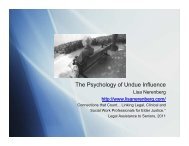Undue Influence: Definitions and Applications - California Courts ...
Undue Influence: Definitions and Applications - California Courts ...
Undue Influence: Definitions and Applications - California Courts ...
You also want an ePaper? Increase the reach of your titles
YUMPU automatically turns print PDFs into web optimized ePapers that Google loves.
past efforts <strong>and</strong> the field of elder abuse prevention is through Margaret Singer, who drew from<br />
her work with POWs <strong>and</strong> cults to formulate a model of undue influence in elder abuse, which has<br />
become the basis for subsequent analyses. Singer identified the following six tactics used by<br />
perpetrators of elder financial abuse (Nerenberg, 1996).<br />
• Isolation. Perpetrators may isolate their victims from family members, friends, trusted<br />
advisors, <strong>and</strong> professionals. Other factors that may contribute to isolation include decreased<br />
mobility, communication problems, illness, sensory deficits, <strong>and</strong> lack of transportation.<br />
Perpetrators may contribute to isolation by preventing seniors from accessing assistive<br />
devices (hearing aids, walkers) or services that could overcome these natural barriers. The<br />
elder may also become isolated as a result of grief <strong>and</strong> depression.<br />
• Creation of a “siege mentality.” Perpetrators may convince their victims that they are the<br />
only ones that can be trusted <strong>and</strong> that others in fact pose a danger to them.<br />
• Dependency. Perpetrators foster dependency by failing to provide assistive devices like<br />
glasses, canes, walkers, <strong>and</strong> hearing aids to elders. They may further fail to provide adequate<br />
food, water, or medication, leading to decline <strong>and</strong> increased dependency on abusers for<br />
sustenance, help, emotional support, information, <strong>and</strong> companionship.<br />
• Creation of powerlessness. As the other tactics take their toll, victims begin to feel<br />
powerless.<br />
• Fear <strong>and</strong> deception. The victim is fearful <strong>and</strong> afraid of everything that is different from<br />
what the manipulator wants. The world is a dangerous place for the victim. Only the suspect<br />
can make him or her feel safer.<br />
• Victim is kept unaware. Perpetrators in essence create false worlds where they control the<br />
information available to victims. They can shape victims’ world to make them more<br />
dependent <strong>and</strong> compliant.<br />
Others in the field of elder abuse prevention have offered additional insights into undue<br />
influence against elders. Some have focused on victims’ characteristics or vulnerabilities (Quinn,<br />
2005). For example, Pennant (1999) used the case of Anne Morrow Lindbergh to suggest how<br />
unresolved grief can be exploited by unscrupulous service providers to achieve compliance for<br />
89




